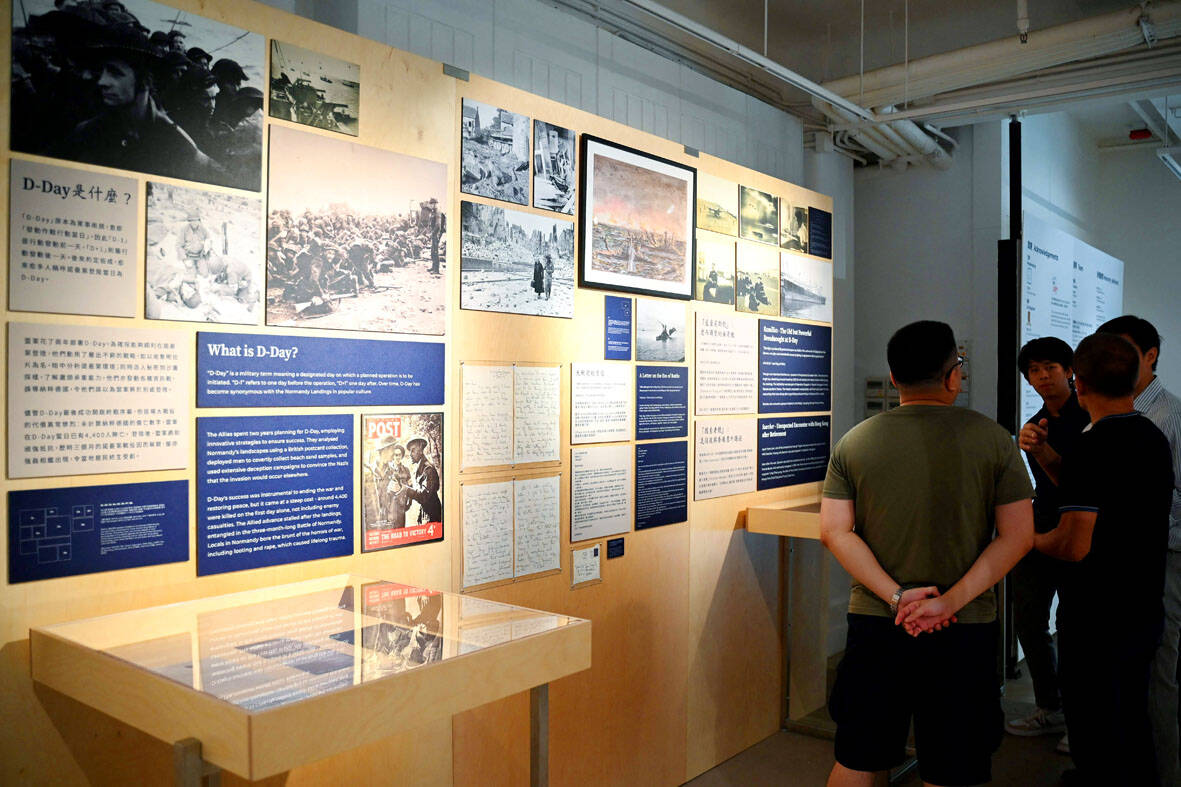The night before June 6, 1944, fleets of warships moved in darkness towards the beaches of Normandy, France, for a massive strike, with Chinese naval officer Lam Ping-yu on one of the vessels.
The ships were as “numerous as ants, scattered and wriggling all across the sea,” Lam wrote in his diary. “Around 5am: HMS Warspite was the first to open fire.”
Lam’s 80-page journal is the centerpiece of a Hong Kong exhibition launching this month, which for the first time chronicles the stories of 24 Chinese officers who helped Allied forces in their landmark D-Day operation.

Photo: AFP
Historians, documentaries and pop culture have often focused on the British involvement in the largest amphibious military operation, which led to the end of Nazi occupation of Western Europe in World War II.
However, little is known about the Chinese naval officers sent to Europe for training. Lam, then 33, was serving on the British warship HMS Ramillies which, according to his diary, opened fire about an hour after HMS Warspite.
“Throughout the day, Ramillies fired over 200 15-inch rounds, but the (Nazi) fort’s cover and positioning kept it from annihilation,” he wrote.

Photo: AFP
Digital copies of Lam’s previously unseen diary will be displayed at the Fringe Club and the Chinese University of Hong Kong this month.
“We believe this historical episode belongs to everyone in both the East and the West,” said John Mok, 32, a public policy advocate and one of the organizers of the exhibition. “Sometimes we would ponder whether it was the Chinese helped liberate the West, or the West helped train the Chinese navy? It was actually ‘you are among us and we are among you’,” he said. “I believe such inherent friendship is very precious these days as it’s beyond politics — the human solidarity in times of war.”
‘FIRST PERSON RECORD’
The Chinese government selected 100 officers between 1943 and 1944 to receive training in the US and Britain to rebuild China’s naval force after it was destroyed by Japan, one of the Axis powers aligned with Nazi Germany.
The first batch of 24 officers sent to Britain included Lam and his comrade Huang Tingxin, whose son Huang Shansong will attend the Hong Kong exhibition.
“The strategic consideration at that time was to connect China’s fight with the world’s anti-fascist war... so that with the support from the US and Britain, China could better defend Japan’s invasion,” said Huang, who is a Chinese history professor based in Hangzhou.
Huang published a book of his father’s oral history in 2013 but said he found Lam’s diary more valuable for its accuracy, compared to his father’s decades-old memories.
“Lam’s diary is by far the only first-person, on-the-spot record about the 24 men’s internship in Britain that is known to us today,” he said.
He will bring his father’s Legion d’Honneur — awarded in 2006 for the elder Huang’s contribution to France’s liberation — to lend to the exhibition.
“He always told me wars, in particular modern wars, were shockingly destructive,” Huang said. “The importance of peace cannot be emphasized more.”
‘A WIDER AUDIENCE’
Lam’s diary almost ended up in landfills.
After the war, the naval commander lived in Hong Kong until the late 1960s and left the bulk of his personal items — including the diary — in his brother’s apartment.
Rescued by a photographer and an amateur historian before the building was demolished, the diary caught the interest of Angus Hui, a former journalist who obtained a photocopy for his postgraduate study in Chinese naval history. Hui met Mok last year, who suggested the stories “deserve a wider audience.” While conducting research trips to China, Taiwan, Singapore and Europe, where the veterans had settled after the war, they found that Hong Kong was the most suitable place for the exhibition.
Hui said he hopes the exhibition can address Hong Kong’s place in today’s world. The former British colony — once branded “Asia’s World City” — has fallen out of favor in recent years with Western governments, which have condemned Hong Kong over a rights crackdown following democracy protests in 2019. But Lam’s decision to come to Hong Kong “reflected the uniqueness of this place,” Hui said.
“People may say Hong Kong is no longer relevant... But from history and from our own experience, we find Hong Kong still relevant,” he said.

Late last month Philippines Foreign Affairs Secretary Theresa Lazaro told the Philippine Senate that the nation has sufficient funds to evacuate the nearly 170,000 Filipino residents in Taiwan, 84 percent of whom are migrant workers, in the event of war. Agencies have been exploring evacuation scenarios since early this year, she said. She also observed that since the Philippines has only limited ships, the government is consulting security agencies for alternatives. Filipinos are a distant third in overall migrant worker population. Indonesia has over 248,000 workers, followed by roughly 240,000 Vietnamese. It should be noted that there are another 170,000

Hannah Liao (廖宸萱) recalls the harassment she experienced on dating apps, an experience that left her frightened and disgusted. “I’ve tried some voice-based dating apps,” the 30-year-old says. “Right away, some guys would say things like, ‘Wanna talk dirty?’ or ‘Wanna suck my d**k?’” she says. Liao’s story is not unique. Ministry of Health and Welfare statistics show a more than 50 percent rise in sexual assault cases related to online encounters over the past five years. In 2023 alone, women comprised 7,698 of the 9,413 reported victims. Faced with a dating landscape that can feel more predatory than promising, many in

“This is one of those rare bits of TikTok fitness advice with a lot of truth behind it,” says Bethan Crouse, performance nutritionist at Loughborough University. “Sometimes it’s taken a bit too literally, though! You see people chugging protein drinks as they’re scanning out of their gym.” Crouse recommends the athletes she works with consume 20-30g of protein within 30-60 minutes of finishing a resistance training session. “The act of exercising our muscles increases the breakdown of muscle proteins,” she says. “In order to restore, or hopefully improve them — and get gains such as increased muscle mass or strength —

“Far from being a rock or island … it turns out that the best metaphor to describe the human body is ‘sponge.’ We’re permeable,” write Rick Smith and Bruce Lourie in their book Slow Death By Rubber Duck: The Secret Danger of Everyday Things. While the permeability of our cells is key to being alive, it also means we absorb more potentially harmful substances than we realize. Studies have found a number of chemical residues in human breast milk, urine and water systems. Many of them are endocrine disruptors, which can interfere with the body’s natural hormones. “They can mimic, block